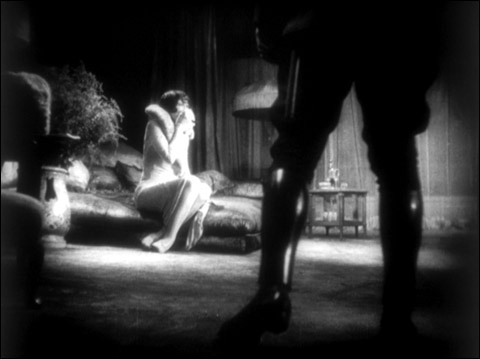
ASPHALT: Let’s hear it for authority figures who look good in a uniform. |
As the title of Siegfried Kracauer's landmark book From Caligari to Hitler puts it, the politically shaky, culturally fertile Weimar Republic lasted roughly from Robert Wiene's nightmarish Expressionist allegory The Cabinet of Dr. Caligari (1920) to the establishment of the all too real Third Reich in 1933. During this period, Kracauer argues, the German film industry created a movement that not only transformed cinema but also reflected the fevered id of its audiences like a prophetic mass dream, serving in effect as their collective unconscious. In short, the kind of thing Hollywood producers would die for. In its series "Decadent Shadows," the Harvard Film Archive will present 13 of these films — which, despite being in black and white and mostly silent, remain as urgent and timely and in many cases as sublimely strange and beautiful as when they were made.
"What do you think of Expressionism?" someone asks the title villain of Fritz Lang's two-part, 240-minute DR. MABUSE, THE GAMBLER (1922; Part I November 27 at 7 pm; Part II November 28 at 7 pm) as he takes him on a tour of some ugly paintings. "It's all play," replies the incognito arch fiend. "By why not? Everything is play." What Mabuse (Rudolf Klein-Rogge, Metropolis's Rotwang) plays with, as one of his hopelessly smitten followers ruefully notes, is "people and faiths." Like the title maestro of Dr. Caligari, he is a mesmerist who, using his will power and primitive disguises, compels wealthy individuals to lose at cards. For bigger stakes, however, he employs dirty tricks all too familiar to us today to spin the stock market and make a killing.
A series of linked escapades related with breakneck verve by Lang, unfolding in equally exhilarating sets that look like a combination of Busby Berkley, Tim Burton, and Ivan the Terrible, Part III, the film explores the dastardly extent of Mabuse's empire and the fumbling attempts of an idealistic and dull prosecutor to hunt him down. Compared with, say, Darth Vader, however, Mabuse is really a decent guy. His minions serve him not just out of fear but also with love. It's the kind of rapturous, self-annihilating devotion that would characterize his National Socialist counterparts in the real world.
At the time, of course, Hitler was plotting the abortive 1923 "Beer Hall Putsch." Ten years later, he would come to power, and his cultural minister, Josef Goebbels, would offer control of the national film studio Ufa to Lang, who by then had earned international renown as the director of such films as Metropolis (1927), M (1931), and the five-hour, two-part DIE NIBELUNGEN (1924; Part I December 11 at 7 pm; Part II December 13 at 7 pm), the Harry Potter or Lord of the Rings of its day. Lang's answer? He fled to Hollywood.
If Lang's Mabuse embodies the malignant powers that rule the world, the porter portrayed by Emil Jannings in F.W. Murnau's groundbreaking THE LAST LAUGH (1924; December 3 at 7 pm) stands in for the faceless millions who are victimized. Or does he? Although generally regarded as a sympathetic plea for the dignity of the working man, the film can also be seen as a reactionary lament for a lost order.